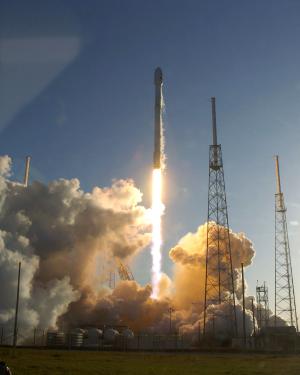June 29 (UPI) — SpaceX launched its 15th resupply mission to the International Space Station Friday, carrying tons of equipment into orbit for science experiments.
The company’s Dragon spacecraft was launched by a Falcon 9 rocket from Space Launch Complex 40 at Cape Canaveral Air Force Station in Florida. Blastoff occurred at 5:42 a.m. EDT.
The launch was streamed live on NASA TV.
The cargo ship is carrying 5,900 pounds of research, crew supplies and hardware to the space station. The trip from Earth to ISS will take a little more than three days.
Roughly ten minutes after launch, the spacecraft was released into orbit. Over the weekend, a succession of thruster firings will push the Dragon spacecraft closer and closer to the space station.
When the craft reaches ISS on Monday, NASA astronaut Ricky Arnold will maneuver the Canadarm2 robotic arm to retrieve and dock the capsule. NASA astronaut Drew Feustel and Serena Auñón-Chancellor will assist the docking mission.
In the coming weeks, the space station’s inhabitants will keep busy carrying out a variety of science experiments being delivered by the cargo ship.
Several experiments will test space-based plant growing technologies. Other experiments will focus on the affects of microgravity on systems in the human body.
One study will look at the behavior of microbial communities in the digestive tract under microgravity conditions. The study will also look at how sleep-wake cycle disruption alter the makeup of microbiota in the gut and how those changes affect human health. The findings could have implications for the treatment of gastrointestinal, immune, metabolic and sleep disorders on Earth.
Some of the experiments will offer the chance for some fun. Crew members will get to play with Mobile Companion, an AI prototype developed by engineers at the European Space Agency. The robot is designed to “mitigate crew stress and workload during long-term spaceflight,” according to a NASA release.

COMMENTS
Please let us know if you're having issues with commenting.